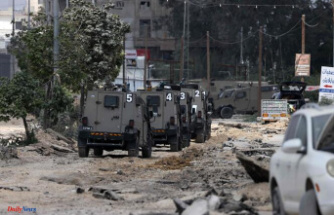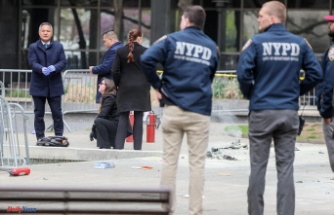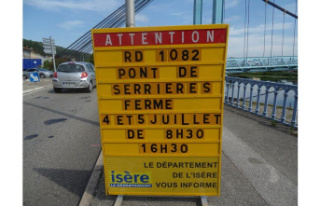What world, what French people, which society told "le Nouvel Observateur", which became "l’Obs" in 2014. It was half a century ago. Each weekend, we offer you a letter, article, report, portrait, or interview from readers drawn from our archives.
How can a torturer, assassin, and militiaman of Jews and resistance fighters during Occupation be granted a presidential pardon by the president? Paul Touvier (1915-1996), who spent years hiding under religious orders, was able to obtain a pardon from President Georges Pompidou on November 21, 1971. The secret pardon was only made public by Jacques Derogy, a journalist.
This scandal is massive, and "le Nouvel Obs", a French journalist, explains that the scandal has shocked former resistance fighters. However, Pompidou did not cover many of Touviers' crimes and he was charged with crimes against humanity. After being sheltered once more by Catholic communities, Touvier was finally arrested in Nice in May 1989. The case was dismissed by the Paris Indictment Chamber, which was then overturned by the Court of Cassation.
Touvier was brought before the Assize Court of Yvelines in March-April 1994. He was sentenced to life imprisonment for complicity with crimes against humanity. He died at Fresnes prison in 1996, aged 81.
T.N.
Article published in Le Nouvel Observateur, Monday, July 3, 1972.
(The title and typography are both contemporary).
It is under the combined auspices power and a certain priest, it is a forgotten France which recrystallizes: That which acclaimed Petain
By Josette Alia
Touvier will suffice, France must live again in 1940. The old pains and anger we thought were gone have been extinguished. Paul Touvier is the Militia. The khaki shirts and black berets are the Militia. These include the executions, denunciations, hunt for Jews, Freemasons, resistance fighters that were hunted down, tortured and shot. This is the French unworthy war against other French. The shame of France is the Militia. It's more than Vichy and the Gestapo.
Today, we find out, quite late and almost clandestinely that an important militia leader had his rights restored. He has his property (or that of the robbers he robbed), and he is virtually absolved. We understand that the Resistance regroups and is indignant. We know that she asks questions. We know less than anyone, officially. This mystery is so ambiguous that it can't be explained. It is then what does it cover that we refuse to lift the thick veil of "regal" grace, the sacred "regal" right?
It actually covers a lot. We find, in a somber novel that is still full of holes, financial traffic and great feelings. Legal aberrations, state secrets, big state secrets, huge emotions, legal aberrations, large state secrets, the Elysee and the Vatican. And, most importantly, the interests of Christ everywhere.
Let's begin at the beginning. That is, with Touvier. We are in the midst of the war. Chambery's little gray house is where the father lives. He is a veteran, a fiery cross, a convinced Catholic, and he is devoted to tax collection. In remembrance the law regarding congregations. Petain's photograph is displayed on the piano. The evening is filled with memories of the Chemin des Dames. The mother? The mother? Families? "People like to be few. It should be." The baker and the grocer say it today. A 1937 provincial Catholic family who, just like the others, responded to defeat by throwing their arms into the arms Marshal "our savior".
"I saw some rolling at mine"
Paul Touvier was the son of a soldier who fought in what was at that time called a "beautiful battle". On the ephemeral Front, he even met Darnand, whom the "Match", at the time, presented as a hero on the cover, with his chest covered in medals. Touvier joined Vichy in 1940 on this momentum. Cardinal Gerlier did not exclaim in the pulpit in Lyon Cathedral on November 18, 1940: "Petain! It is France!" France is Petain! In its vast majority, the episcopate followed and was sometimes enthusiastic. Finally, there is a Christian power. A power that will restore order, morality, and the freedoms denied by the Communists, "permanent ripple", "Godless" education, strikes, the Yids, and the Freemasons. ...
We all know the sequel. France is in a rut. The Resistance is organized. The Church is divided - it must be said. (One can read the excellent book "Les Catholiques francais sou l'occupation", Grasset 1966). He is committed to Touvier. He was made worse by his entry into the S.O.L. Vichy just created the Legionary Order Service (Local Order Service). Under Lecussan's orders, he was made head of the 2nd Lyon Militia service. What was the role played by the Militia during the occupation? This is something we shouldn't need to recall. The militiamen, who are terrorizers of resistance fighters, and denouncers for Jews, are both hated and feared throughout France.
Is this what Touvier believes? What drives him to work with hounds? Anti-Semitism? ("The Jews were cowards, he would later say to a friend. I saw them rolling over at me and saying to each other: "Take all we have, but leave us our lives." It is a shameful act of contempt, but it also reveals how much ...) matters. It is only what he does that matters. But, what exactly? It is difficult to draw up an accurate inventory today, 30 years later. The death sentences of Touvier, in Lyon in 1945 and Chambery in 1947 were based on vague indictments. They are based on a 1945 letter that Captain Vallet (of Militia) sent. The sentence was rendered in absentia due to the lack of clear memories and the possibility that the enumeration could prove useful later. Militia crimes didn't have to be proved in 1945. One resistance fighter said it best: "It was so evident that Touvier had been a murderer!" We knew all of the names of his victims.
However, it will be necessary to wait until 1970 in order to find out, through an investigation led by Jacques Delarue – and at Touvier's request, since it was a matter of Touvier's appeal for clemency – that Touvier was actually present on the 10th of January 1944, when Victor Basch and his wife were assassinated in Lyon. Later, it was established that Touvier was present when seven Jewish hostages were killed by the Resistance after Philippe Henriot's execution. Alban Vistel and Serge Ravanel, Resistance fighters from Lyon, remember an engagement between Frankish groups, militiamen in Vantria in the suburbs Lyon at which the resistance fighters were taken prisoner.
Witnesses, everywhere, reappeared
Last Friday in Chambery, Jean Gachet and Louis Crida, resistance fighters, recounted the abuses and assassinations committed by Touvier. Sometimes they were the victims. Jean-Jacques Levy, a young Jewish man, was also mentioned. He was at Place du Marche 8, Chambery when Touvier and his sinister forces mounted his staircase. Today, witnesses reappear everywhere, and the victims rise. This sinister ballet must be revived. You must prove the horror meticulously, patiently, and legally. Twenty years later, the prescription is in place, and the ambiguity has creeped in.
First question: How was Touvier able so long to escape death row? Is it possible that he is still alive after being twice executed by different courts? It is obvious that the Church has everything covered. It's more than covered: He escaped justice. This is not a case he is alone in. A veritable network of nuns, priests, and convents formed in 1945 almost all over France, including Savoy. They collected, hid, protected, and supported for many years former militiamen and collaborators. Is this the "cassock plot", which was partially discovered in 1947, but never brought to light? Do we see a French Opus Dei? A right-wing, clandestine Vichy branch of the Church of France, or a reflex of Christian charity, an oblique remnant of the old right to asylum?
Mailbox of the Archbishop
These motivations are certainly interrelated. The case of Touvier, however, is more unusual and specific. He is the archdiocese Lyon, which has for 27 years provided him with shelter and constancy. A letter addressed to "Monsieur Paul Touvier", 1, place Fourviere in Lyon" was sent again on June 16. It was addressed to the archdiocese, which for over twenty years had been his "mailbox". The envelope was doubled (by who?). As usual, the letter was forwarded to Madame Monique Berthet (3, rue des Charmettes), Chambery - his wife's home, where he was eventually hiding. We can see that he kept up his loyal friendships in the Catholic hierarchy until today. Monseigneur duquaire was the most remarkable, most active, and most consistent of all. He was secretary to Cardinal Gerlier, then to Cardinal Villot. Today, he is Secretary of State at the Vatican. Touvier owes most of his grace to him.
Since 1945, Mgr Duquaire has tirelessly worked to weave a patient web of attestations and testimonies, reconstructions, in order to "rehabilitate” Touvier. Did you receive the dossier? It was created by Bishop Duquaire. Who were the people contacted? Always Bishop Duquaire. Interventions to "push" Edmond Michelet and Jean Foyer who were both subject to de Gaulle’s refusals. Again Bishop Duquaire. Let's close with an extremely troubling fact. The pardon, initially refused by President Pompidou on July 1971, was signed by him in November 1971. This was four months after he had first refused it. What had happened in the interim? Two trips, Rome to Paris by Monseigneur duquaire.
Today's explanation by the bishop of Lyon, that of "Christian charity toward a repentant sinner", seems a little too short. It is puzzling that a French high-ranking prelate, Mgr Duquaire took care of a former militiaman for 27 years and then lobbied to get his pardon. What was the connection between these two men? What was it that connected Touvier and the Church? It is impossible that Cardinal Villot's secretary acted without referring back to the higher authority, and that he alone was able to move Elysee, who is reputedly insensitive. The Church will need to provide a clear explanation on this matter. There is already a rumor that Touvier would be able to access large sums of money during World War II. The funds would have been sent to Switzerland in large amounts, with a small amount coming from the Lyon episcopate's "secret accounts".
"If Touvier uses his records..."
The Church dignitaries in Paris are quiet and murmur "It's an Lyon affair." On Monday 26 June, Charles Duquaire, an ardent Catholic, flew to Lyon in a hurry "to search, he stated, for a portable altar." Then he disappears, vanishes and melts. One thing is certain in all these cases: Touvier threatens. He speaks of miscarriage in justice. He claims to be innocent. He sends him notes and certificates for acts of resistance, including one from Father Stephane Vautherin (parish priest of Saint-Sorlin), ex-chaplain to the Militia who swears that Touvier was freed along with 42 other prisoners on August 20, 1944. Why didn't he do so during his two trials? We add, however, that Touvier also has files which he can access. That will be the tragedy. Who is drama for? The public has the right of knowing.
Someone seems to already know: Georges Pompidou. Because - and this second mystery is important - he signed that grace. Why? Officially, we answer: With the goal of national appeasement. After all, the file seemed good. About thirty favorable letters were emanating from high civil, religious and political personalities. Some big names of Resistance (among other Edmond Michelet), and some generals, companions to the Liberation testified in favor of Touvier. What does it say that it doesn't? Why should we erect walls of silence everywhere, even in the Assembly?
Again, this is the best explanation. The Elysee Palace has been long irritated by the sight of Cardinal Marty, a "red", cardinal at the head of Church of France. The cardinal who does not seek power, but also opens up avenues for criticism and even contestation. This cardinal wearing a Basque beret appears rebellious. The priests get married and the strikers are blessed. In November 1970, Secretary of State Billecocq was directly negotiating with the Vatican to renew the Debre law on education. He had discreetly asked Pope Francis for the replacement for Bishop Marty. Pope's response: Impossible. The world is not the same as it was. Even if Rome can resolve certain matters over the heads the French episcopate, Rome cannot intervene as harshly as it did before. However, the demand remains. It may have been a good policy to satisfy the Vatican Envoy regarding this Touvier matter - but who knows?
We can see it. Far from Resistance. Far from those who were killed in the night for a different idea of France. Compromising files and state secrets, as well as political combinations, is this what balances out the greatest?
"What we reject is contempt for those who are dead"
There is an easy way to show that you are not guilty of the crime and end the scandal. This involves not reopening the trial. It's possible in any way. Touvier was, in fact, sentenced twice more after his 1945 and 1947 trials (on which the prescription, and consequently the current pardon)). The Lyon court of first instance sentenced Touvier by default to five year imprisonment and a ten-year ban on his stay due to the attempted theft of June 3, 1946. The same court pronounced a second judgment on November 3, 1949. It sentenced him to another five-year term in prison and ten-years ban on his residence. It was not a matter of acts of war but common law offenses in 1946. The two penalties are, however, cumulative because they are imposed by default. Touvier is currently serving a ten year sentence in prison and is prohibited from staying until 1979. All the crimes that Touvier is accused of - including the assassination and execution of seven Jewish hostages - can be considered "new material" and subject to a retrial. If the government or the relatives of victims wish to open an "information" against X, Touvier would have the chance to prove his innocence - if needed - and would also be able to open a file that appears to be too cluttered. Touvier is at great risk because the mass executions or assassinations for which he is charged are not common crimes. They have been considered "war crimes" in France since 1964 and are therefore imprescriptible.
A known resistance fighter said, "We are not bloodthirsty, and we absolutely do not want this man's skull." "What this grace represents, we reject it: derision and contempt for the deceased, oblivion. Another said, "Resisters don't feel angry. They are worried. They are bitter. Or, more important, they are deeply saddened." They feel that the Touvier matter, under the combined auspices a certain Church and the Elysee, is also recrystallizing. It is the one that acclaimed Petain and the one who accepted Vichy. Was the Resistance's fight in that time futile?
JOSETTE ALIA












